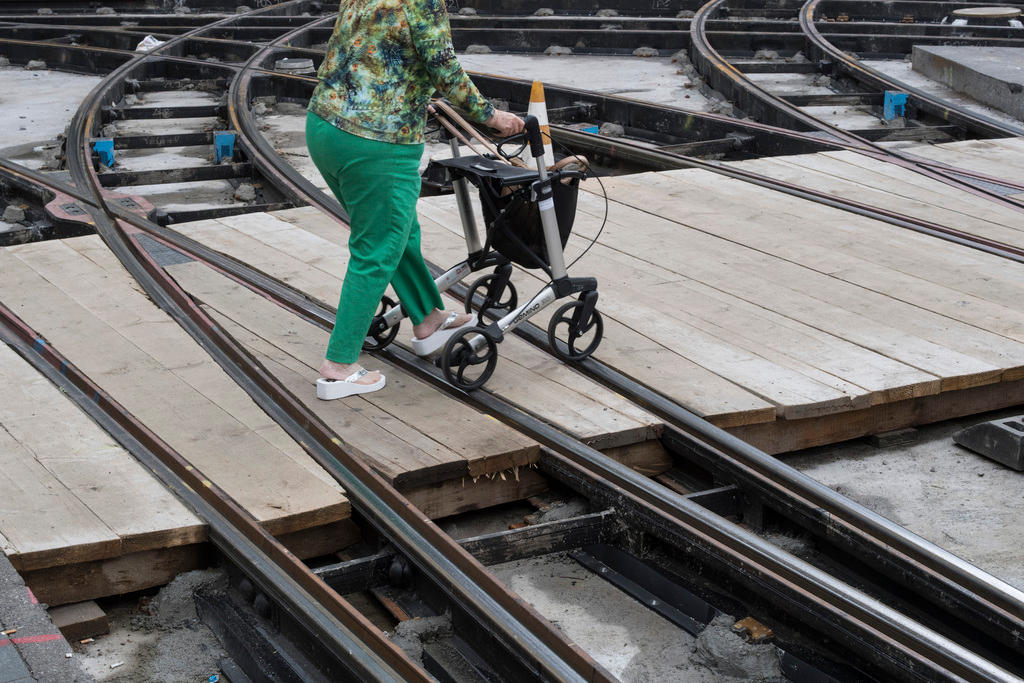Swiss to vote on raising retirement age to 66: a visionary idea or an unwelcome plan?

The statutory retirement age is once more being put to a referendum. On March 3, the Swiss people will vote on a popular initiative, put forward by the Young Radical-Liberals, aimed at raising the retirement age and pegging it to life expectancy. A number of other countries have already gone down this road.
Just over a year after agreeing to raise the retirement age for women from 64 to 65, the Swiss will go to the polls on March 3 to decide whether to push it back to 66 for all.
If the proposal is accepted, Switzerland will be following the trend seen in the countries of the Organisation for Economic Co-operation and Development (OECD), where the average retirement age is set gradually to increase to 65.7 for women and 66.1 for men by 2060, according to the body’s Pensions at a GlanceExternal link report.
Why vote again on the retirement age?
The retirement age for women in Switzerland went up on January 1, 2024, as part of a progressive, four-stage increase to 65. This is the result of a reform of the old-age and survivors’ insurance scheme (known as the AHV/AVS), the first pillar of the Swiss pension system, which was approved by the electorate in a federal referendum in September 2022.
Two months after this first change came into force, the issue will be back on the table. In March, voters will cast their ballots on a federal popular initiative, submitted by the centre-right Young Radical-Liberals in July 2021 with 145,000 signatures.
The initiative “for a secure and sustainable old-age pension scheme” proposes gradually increasing the statutory retirement age for women and men to 66 by 2033. After that, it would be pegged to life expectancy. In other words, it would be raised automatically if life expectancy increased, and vice versa.
Specifically, the text proposes raising the retirement age by 80% of any increase in life expectancy. Thus, if life expectancy goes up by one month, the retirement age will rise by 0.8 months. The goal of the initiative’s promoters is to enable people to spend around 20% of their lives in retirement. Following this formula, retirement at 67 would come about by 2043 and retirement at 69 in 2070.
Although it has been taken up by the Young Radical-Liberals, this solution for closing the public pension funding gap is not new. The Conservative Democratic Party proposed it in 2012 in a motion that was rejected by the senators.

What impact would the initiative have on state pension funding?
In 2022, the old-age insurance scheme closed its books with a profit of CHF1.6 billion ($1.8 billion) and assets of CHF47 billion. Its finances have thus stabilised for the moment. This is partly thanks to the reform measures, known as AHV/AVS21, adopted in 2022 and the federal act on tax reform and pension funding passed in 2019, which led to a drop in expenditure and increase in revenue.
In the medium term, however, state pension funding is not guaranteed, as the scheme is facing a structural problem. The number of people receiving a pension is increasing faster than those in gainful employment, and as life expectancy increases pensions need to be paid for longer. According to projectionsExternal link by the Federal Social Insurance Office, the AHV/AVS will be in deficit from 2031.
Raising the retirement age to 66, as called for by the initiative, would enable a saving of around CHF2 billion by 2030, again according to the Federal Social Insurance OfficeExternal link. Pension funding would thus be guaranteed at least until 2033.
What are the main arguments for the initiative?
The state pension scheme urgently needs to be put on a sustainable footing, the Young Radical-Liberals argue, to prevent it from collapse. The party presents its text as the solution to guarantee long-term financing, without cutting pensions or adding taxes.
The initiative’s promoters also believe that linking the retirement age to life expectancy would help depoliticise the issue, by creating an automatic mechanism for adjusting the benchmark age.
As we live longer, we also have to work longer to pay for our pensions, the Young Radical-Liberals say. Other Western countries have already taken this step, they argue.
What are the main arguments against?
According to the federal government, pension funding is currently guaranteed for the next ten years or so. Measures will certainly need to be taken to ensure long-term financing. However, the Federal Council – the executive body – is already drawing up a plan to stabilise the AHV/AVS for the 2030 to 2040 period, which it will submit to the parliament in 2026.
The government also argues that the demographic problem facing the old-age provision system cannot be resolved solely by raising the retirement age. Other measures are needed, including additional funding.
The idea of pegging retirement age to life expectancy has not won over the authorities either. In their view, an automatic mechanism of this kind would not take sufficient account of the actual situation on the labour market – particularly that of older people – or the social situation.
It would moreover not be compatible with the Swiss political system. By enshrining the retirement age in the constitution, the government, the parliament and the people would lose the necessary flexibility to take other criteria into consideration.

Who is for and who against?
The Radical-Liberal Party supports the initiative of its youth section, but it stands alone in this. The other government parties oppose it. The government and a large majority in the parliament are also recommending voters to reject it. Unsurprisingly, the business community is in favour of the initiative, while the trade unions are against it.

More
How to guarantee the pensions of the next generation
How do things stand in other countries?
A number of European countries have already opted for more or less automatic mechanisms to link the retirement age to changes in life expectancy, as laid out in a reportExternal link by the interior ministry. These include Sweden, Denmark, Finland, Portugal, Italy, the Netherlands, Greece, Bulgaria and Estonia.
The systems put in place in the different countries have different features, however, and the experience gained so far is limited, meaning it is early days to draw conclusions.
Portugal and Italy are the only countries whose retirement age has actually been raised by an automatic mechanism. In Portugal, it has increased by just a few months and currently stands at 66 years and four months. In Italy, meanwhile, the introduction of this mechanism led to a steep hike in the retirement age: from 60 in 2012 to 67 today.

More
Explainer: the three Swiss pension pillars

In compliance with the JTI standards
More: SWI swissinfo.ch certified by the Journalism Trust Initiative












You can find an overview of ongoing debates with our journalists here . Please join us!
If you want to start a conversation about a topic raised in this article or want to report factual errors, email us at english@swissinfo.ch.